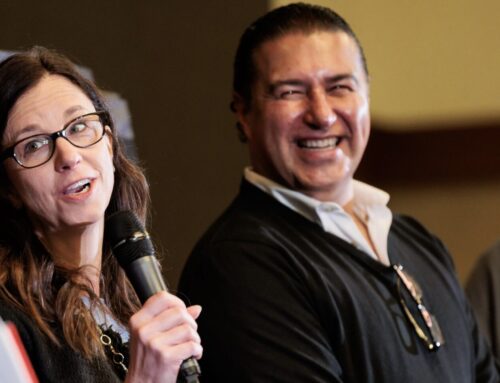This week our Director of Innovation, Kat Murray-Clark, attended the largest tech conference in the world, Web Summit. Over the course of the week, she gained insights on the future of corporate innovation and what we can learn from the latest tech trends. Here is the first of her two-part update written whilst at the event.
This week over 70,000 attendees have gathered in Lisbon to attend Web Summit 2019. Attendees include the founders and CEOs of successful tech companies and fast-growing startups, policymakers and heads of state. Key to their agenda was corporate innovation.
“We are all here to discuss the shape of our future” – Michel Barnier, EU’s Chief Negotiator on Brexit
Corporate innovation’s next frontier: 5G and the 4th Industrial Revolution

All of us have heard about 5G, but many of us may not have realised just how revolutionary this innovation will be. According to Ronan Dunne, Executive VP and Group CEO of Verizon. “5G is not just another ‘G’…” he says. “It’s so powerful that in truth, the best way to think about it is that in fact it is a whole new technology ushering in a new era of transformation.”
Throughout modern history, industrial revolutions have coincided with the arrival of new general-purpose technological innovations. These serve as drivers for whole categories of future corporate innovation. 5G is leading the 4th industrial revolution by powering highly connective technologies that blend the physical and digital realms.
The power of 5G
Opening on the Center Stage for the first full day of talks, Dunne discussed eight of the capabilities (or “currencies”) of true 5G. These include: reliability, latency and service deployment. However, the most impactful capability – and the one which Dunne was clearly most passionate about – was ‘Energy Efficiency’.
Energy consumption for 5G is expected to be only 10% of that currently used on 4G. Because of this, together with its power to connect across devices and provide real-time insights, it has the potential to improve energy efficiency and cut carbon emissions. It does this by speeds up connectivity across the supply chain’s production cycles, from manufacturing to shipment and packaging. Dunne even believes that the 4th industrial revolution could actually reverse the damage set in motion by the previous three.
“5G will matter, not only for business and consumers. But fundamentally, the future of our planet”
He ended the talk with a call to action, inviting everyone to think expansively about their potential power to inspire and mobilise others and exercise their unique agency in addressing the challenges caused by climate change and extreme poverty across the world.
Innovating against crisis

In today’s business environment, disruption and crisis are inevitable. Fortunately, sometimes corporate innovation is too.
These crises can come in any size or severity but, according to Ricardo Vargas speaking at the Corporate Innovation Summit, there is always something to learn from them. In fact, a crisis can lead to innovations and improvements across organisations. From your leadership capabilities to processes and business opportunities, they can have a lasting positive impact far beyond the initial crisis.
So, how do you find a positive outcome and transform an organisation using the learnings from a crisis situation? How do you create or maintain the right circumstances to be able to take advantage of the next corporate innovation?
We all know from personal experience that when something major happens in your life your priorities automatically shift. You’re no longer worried about minor irritations and worries, whether you’re fulfilled in your job, or whether your house could be bigger. You focus on what really matters. The same is true for organisations.
Brightline Initiative set out to identify ways that organizations can leverage the experience of a crisis to improve and innovate the way they integrate strategy, design and delivery.
4 lessons you can learn from a crisis
There are 4 main lessons you can learn from a crisis which you can implement to improve your business strategy:
- Focus on what matters: commit to a plan and prioritise your strategic initiatives, and let go of what is no longer relevant.
- A need for speed: in a crisis every hour is important, but how you use your time is always important. What’s slowing your organisation down? How fast can you change in order to improve your decision-making process?
- Power to the people: empower key employees, reduce hierarchy and bring the decision-making process closer to the problem itself.
- Commit to communication: People often shut down during a crisis, choosing to remain silent until they have “all the information” because they are worried that speaking up might make the problem worse. But to escape a crisis as a team you need to communicate in a fast and effective way. Use this as an opportunity to align the organisation behind a shared vision, and don’t lose sight of that “why”.
One statistic that struck me was that 93% of high-performing organisations believe crisis uncovers talented leaders. People want to make an impact and a contribution and will rally together during a crisis. This could range from volunteering to work during the Ebola crisis, or inviting people into their homes after 9/11. The lesson is clear: if you empower people, they will always go the extra mile.
Why do so many organisations fail to transform themselves?
“They think it’s all about money or all about technology. It’s not. It’s about people.”
The Brightline Project Management Institute and Quartz Insights report on ‘Learning from Crisis Mode’ is available to download for free on their website: https://www.brightline.org/learning-from-crisis-mode/

Thinking outside the box
Inspiring words of Intentionality from Wladimir Klitschko and Kristen Garcia Dumont
Wladimir Klitschko holds the record for the longest cumulative heavyweight title reign of all-time. Kristen Dumont is the CEO of mobile gaming leader Machine Zone. She has been referred to as “the only woman running a games publisher in a kingdom of men.”
They both spoke on the Center Stage with Halsey Minor about what they believe it takes to overcome adversity and the qualities which account for their success.
Their intentional advice:
“You’re only going to be successful if you know your mistakes. Face your challenge, don’t be a coward. You can be scared and afraid but let it make you smarter and harder.” – Wladimir Klitschko
“Will power is the strongest force that we have. If you believe you can do it, you can.
Women are often told they have to choose between business and family. I don’t need to make those choices, I know you can succeed at everything you do if you have extraordinary will.” – Kristen Garcia Dumont





